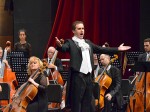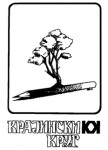11:00
11:00 Music gazebo
Concert: Classical music at 11
Participants of the choirs’ competition
19:00
19:00 Cultural Centre’s Gallery
Paintings exhibition: Echo of the music
18th Art Colony of the Cultural Centre
 Art Colony Vratna was founded in 1999. During the eighteen years of existence, this art workshop has become a significant segment of cultural identity of Negotin. After ten years of existence, the colony moves from Vratna to Rogljevo and the two last assembles reside and work in the city. Since 2009, the colony is organized under the name Echo of the music, which is kind of visual feedback to the Festival Days of Mokranjac where the art works made at the colony are exhibited. Rich collection of works, created thanks to the workshop, has over four hundred works of artists from Serbia and abroad, different ages, from art students to aged artists.
Art Colony Vratna was founded in 1999. During the eighteen years of existence, this art workshop has become a significant segment of cultural identity of Negotin. After ten years of existence, the colony moves from Vratna to Rogljevo and the two last assembles reside and work in the city. Since 2009, the colony is organized under the name Echo of the music, which is kind of visual feedback to the Festival Days of Mokranjac where the art works made at the colony are exhibited. Rich collection of works, created thanks to the workshop, has over four hundred works of artists from Serbia and abroad, different ages, from art students to aged artists.
This year’s convolution worked with the following members: Marija Radosavljević, Jasna Bosić, Svetlana Šanta, Sanja Radosavljević, Biljana Matić Bakaluca, Silvija Bogić, Boban Bosić, Aleksandar Zlatojević, Danijel Babić, Djula Šanta.
20:00
Isidor Bajic
PRINCE IVO OF SEMBERIA
Opera in one act
Concert performance
Libretto: Branislav Nusic
Edited by: Aleksandar Kojic
Conductor ALEKSANDAR KOJIĆ
Choir prepared by: Vesna Kesić Krsmanović
Cast:
Prince Ivo_Nebojsa Babic
Kulin Bey_Aleksandar Sasa Petrovic
Prince Ivo’s Mother_Marina Pavlović Barac
The priest_ Goran Krnjeta
Turkish Gazette_Željko R. Andric
Mujezin_Aleksandar Tolimir
The Choir and Orchestra of Serbian National Theatre participate in the program
Concert master: Vladimir Ćuković
Stage setting: Katarina Tasić Mateovič
Set designer: Saša Senković
Music Associates: Danijela Hodoba Les, Strahinja Djokic
Stage Manager: Tanja Cvijic, Dejan Teodorović
Lighting Designer: Marko Radanović
 Prince Ivo of Semberia was created in the first decade of the 20th century and it is chronologically the fifth composed and the second performed Serbian opera. Before it, the only opera that was publicly performed was At Dawn by Stanislav Binički in 1903.Prince Ivo of Semberia is based on the short one act drama by Branislav Nusic, with a tragic ending, inspired by the historical figure of Ivan Knezevic and true story that took place in the village of Popovo in Bijeljina, principality Semberia in 1806. Musical dramaturgy is primarily characterized by opposition of Serbian and Turkish camp and careful characterization of the main characters: Prince Ivo, his mother Boja and Turkish Bey Kulina, with a significant role of the choir as an interpreter of the dramatic action. The opera includes national musical elements drawn from national and spiritual heritage – fragments of Tebe pojem, a folk song, and circle dance Srpkinja, and dance Cocek. These songs are also its most popular parts, often separately performed in various arrangements.
Prince Ivo of Semberia was created in the first decade of the 20th century and it is chronologically the fifth composed and the second performed Serbian opera. Before it, the only opera that was publicly performed was At Dawn by Stanislav Binički in 1903.Prince Ivo of Semberia is based on the short one act drama by Branislav Nusic, with a tragic ending, inspired by the historical figure of Ivan Knezevic and true story that took place in the village of Popovo in Bijeljina, principality Semberia in 1806. Musical dramaturgy is primarily characterized by opposition of Serbian and Turkish camp and careful characterization of the main characters: Prince Ivo, his mother Boja and Turkish Bey Kulina, with a significant role of the choir as an interpreter of the dramatic action. The opera includes national musical elements drawn from national and spiritual heritage – fragments of Tebe pojem, a folk song, and circle dance Srpkinja, and dance Cocek. These songs are also its most popular parts, often separately performed in various arrangements.
Stylistically, this opera oscillates between the conceptions of enriched traditional opera with closed tracks and modestly outlined musical drama. Although the stylistic inconsistencies are obvious, the work is valuable and necessary link in the development of Serbian opera. The music is listenable and light, libretto is up to date, and certain weaknesses in the orchestration and harmonic language, and clumsiness in combining elements of opera and musical drama are logical because for such a complex musical and theatrical work, Bajic had neither the experience nor the right role models in Serbian opera tradition. This opera was first performed in Belgrade, in The Opera on the Boulevard, owned by Zarko Savic on 6/19th of January 1911. Shortly afterwards, the manager of the Serbian National Theatre – Pera Dobrinović handed administration to Zarko Savic, who “just prior to this event hosted in Novi Sad an opera in which on the Epiphany in 1911 performed Bajic’s Prince Ivo of Semberia.” It was the premiere of the one-act play by Bajic in Novi Sad, where opera Prince Ivo of Semberia was performed for six times as premiere. Opera was performed for 45 times – 35 as the scene performance and 10 times as a concert performance.
Isidor Bajic (Kula, 1878 – Novi Sad, 1915) as a student of the Grammar School in Novi Sad assisted Professor Jovan Grcic in the music business. In the sixth grade, he started composing, and in the eighth he conducted the student choir. Upon his return from Budapest, where he first studied law, then the Music Academy, he became a regular teacher of chanting and singing (1901-1915) in the Serbian Orthodox High school in Novi Sad. He taught students to play violin, piano and tamburitza, and formed a string orchestra, conducted the high school choir and helped gifted students in their first steps of composing. As a result of his pedagogical work, the Project for changing learning chanting and singing in the Serbian Orthodox high school (1912) was created. He founded a music school in Novi Sad in 1909, after the school of chanting of Aleksandar Morfidis –Nisis, the first institution of this kind on the territory of Vojvodina.
He published articles in the field of music and music pedagogy in almost all periodicals and daily newspapers of the time (Brankovo kolo, Matica Srpska Almanac, Zastava, Sloga), started the sheet music edition Serbian music library and newspaper Serbian music magazine. He has written and published two textbooks: Piano and learning piano (1901) and The theory of proper sheet music singing (1904). He noted down folk and Serbian church melodies and used them in his compositions. He compared the Serbian church singing with the chanting of other nations and proposed to Lucian Bogdanovic, Serbian Orthodox Bishop of Buda, editing of Serbian church singing (1907).
His composing opus includes genres that could find application in accordance with the musical taste and the level of performance of its time: solo songs (cycle Songs of love, Album of songs in the spirit of Serbian folk songs, Serbian folk songs from the Mokranjac handfuls, Peasant girls, Autumn is coming my quince); piano compositions (Album of compositions, For Kosovo – Kumanovo, For Slivnica – Bregalnica, Serbian Rhapsody); chamber music pieces (Song Without Words, Pizzicato Polka, Romance); orchestral pieces (Fog fell, Elegy, Farewell to Draga Ruzicka); choral compositions (Song about a Song, Hunters Assembly, Divine Liturgy, Bard’s death, From my schooldays, From my garden); songs with singing (Đido, Rakija, Mena, Divljuša) and one opera (Prince Ivo of Semberia).
Danijela Klickovic
 ALEKSANDAR KOJIĆ, conductor. After completion of graduate and specialist studies in conducting at the Music Academy in Belgrade, he studied at several different master classes for choral and orchestral conducting (Belgrade, Vienna, Mainz, Utrecht), as well as at workshops for ancient music (with Helmuth Rilling and Ton Koopman). Since 2010 he has been the conductor at the Serbian National Theatre in Novi Sad, where he was also the manager from August 2012 to April 2014. In addition to the standard operatic repertoire, he proved himself in the field of modern opera conducting domestic and foreign works created in the 20th and 21st century (Britten, Gotovac, Vrebalov, Orf, Bajic, D. K. Menotti, Barber, Hindemith). In the past few years, he was a guest at the Croatian national Theatre in Zagreb and Croatian national Theatre Rijeka, the Szeged Opera (Hungary), Theatre of Opera and Ballet in Krasnoyarsk (Russia). He is a multiple winner of the Annual Award of the Serbian National Theatre: for conducting the opera The Queen of Spades by P. I. Tchaikovsky, 2012; for the premiere of the opera Mileva by A. Vrebalov 2012; for Gala concert on the 150th anniversary of the birth of Richard Strauss 2015; for editing the scores and conducting concert performance of the opera Prince Ivo of Semberia by Isidor Bajic, 2016.
ALEKSANDAR KOJIĆ, conductor. After completion of graduate and specialist studies in conducting at the Music Academy in Belgrade, he studied at several different master classes for choral and orchestral conducting (Belgrade, Vienna, Mainz, Utrecht), as well as at workshops for ancient music (with Helmuth Rilling and Ton Koopman). Since 2010 he has been the conductor at the Serbian National Theatre in Novi Sad, where he was also the manager from August 2012 to April 2014. In addition to the standard operatic repertoire, he proved himself in the field of modern opera conducting domestic and foreign works created in the 20th and 21st century (Britten, Gotovac, Vrebalov, Orf, Bajic, D. K. Menotti, Barber, Hindemith). In the past few years, he was a guest at the Croatian national Theatre in Zagreb and Croatian national Theatre Rijeka, the Szeged Opera (Hungary), Theatre of Opera and Ballet in Krasnoyarsk (Russia). He is a multiple winner of the Annual Award of the Serbian National Theatre: for conducting the opera The Queen of Spades by P. I. Tchaikovsky, 2012; for the premiere of the opera Mileva by A. Vrebalov 2012; for Gala concert on the 150th anniversary of the birth of Richard Strauss 2015; for editing the scores and conducting concert performance of the opera Prince Ivo of Semberia by Isidor Bajic, 2016.
22;00
 22:00 The House of Prince Todorče
22:00 The House of Prince Todorče
Promotion of Timok region’s poetry anthology:
Sounds of Timok’s lira
Author: Goran Vuckovic
Artistic Association Krajina’s Circle
Participants:
Tomislav Mijovic, Miodrag Sibinovic,Phd Ljubisa Rajkovic kozeljac, Phd, Adam Puslojic, Viseslav Zivanovic,Vlasta Mladenovic, Dragoljub Firulovic,Mihajlo Vasiljevic, Goran Vuckovic,Milan Caci Mihailovic.
Anthology is a selection that rests on firmer aesthetic standards in relation to the panoramas and still carries a certain amount of evaluation and, well, it must be recognized that the anthological selection is anthologist’s subjective choice, not because the editors of anthologies do not want to make an objective choice, but because their tastes are different, and the taste is not to be discussed. This anthology represents a hundred and thirteen poets who were born in the Timok’s region, has published a book of poetry and poem that meets the aesthetic criteria of the editor, because as Bogdan Popovic says: “No poet has all the poems of the same value, there are top quality, but there are also bad poems. So there are no good poets, but good poems.
In this book there are also authors who write poetry for children. It is opened by Branislav Brana Cvetković with two beautiful children poems. The authors are represented in chronological order, by year of birth, from the late nineteenth century to the present day. It is possible that in the singing Krajina there is another poetic collection and some other author who deserves to be found in this book, and to whose poems and the data I did not come; if any, I owe them an apology and I expect that my sin may possibly be removed by some future anthologist.
Artistic Association Krajina’s Circle, founded in Negotin in 1990, brings together the artistic activity of the authors born in Krajina, those who live in Krajina or those who are thematically committed to or find inspiration in it. Literary evenings, musical events, visual art exhibitions and art colony Foam (Pena) represent only a small part of activities of this Association, which is also a publishing house. The association has several art points: Firul Gallery (Negotin), Pena Gallery (Djerdap), Darodavac Gallery (Kobišnica), Black Krajina Museum (Šarkamen), etc. Every year, the Association gives Award for creative workn Felix Romuliana. The former presidents of the Association are Tomislav Mijović, Adam Puslojić, Zoran Milić, Mirko Petković, Radomir Andrić and the current president is Dragoljub Firulović.
Goran Vuckovic
